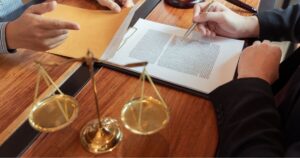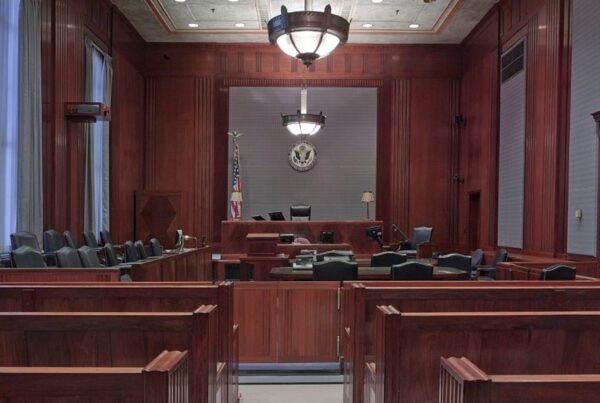 Though it may appear obvious, in legal disputes, both sides may contend that they are the prevailing party in the litigation. This scenario commonly emerges when one or both parties seek legal fees as the victor. It occurs because a plaintiff may present multiple theories of recovery (“counts”) in their complaint against a defendant. During trial, the defendant might have successfully challenged some of these counts or secured victories via a counterclaim. In this article, we delve into how they determine the “prevailing party” in such situations.
Though it may appear obvious, in legal disputes, both sides may contend that they are the prevailing party in the litigation. This scenario commonly emerges when one or both parties seek legal fees as the victor. It occurs because a plaintiff may present multiple theories of recovery (“counts”) in their complaint against a defendant. During trial, the defendant might have successfully challenged some of these counts or secured victories via a counterclaim. In this article, we delve into how they determine the “prevailing party” in such situations.
In Florida, “[t]he party recovering judgment shall recover all his or her legal costs and charges which shall be included in the judgment.” § 57.041(1), Fla. Stat. This statute “mandates that a party recovering a judgment is entitled, as a matter of right, to recover lawful court costs.” Seminole County v. Koziara, 881 So. 2d 83, 85 (Fla. 5th DCA 2004). In other words, “[t]he trial court has no discretion to deny costs under this statute.” Granoff v. Seidle, 915 So. 2d 674, 677 (Fla. 5th DCA 2005). A plaintiff who “recovers money judgment on at least one but not all counts in the cause of action,” is the “party recovering judgment” for purposes of § 57.041(1), Fla. Stat., and is therefore entitled to recover costs. Hendry Tractor Co. v. Fernandez, 432 So. 2d 1315, 1316 (Fla. 1983).
“The test for determining whether a party has prevailed is whether the party succeeded on any significant issue in litigation, which achieves some of the benefit the parties sought in bringing suit.” Mauriello v. Prop. Owners Ass’n of Lake Parker Estates, Inc., 337 So. 3d 484, 487 (Fla. 2d DCA 2022). Thus, “in making a determination as to which party has prevailed, the focus is on the results obtained.” Wells Fargo Bank, N.A. v. Moccia, 258 So. 3d 469, 471 (Fla. 4th DCA 2018). “It is the results, not the procedure, which govern the determination of which party prevailed for purposes of awarding attorney’s fees.” Tubbs v. Mechanik Nuccio Hearne & Wester, P.A., 125 So. 3d 1034, 1041 (Fla. 2d DCA 2013).
Like costs, “a party may recover all attorney’s fees incurred even though the party prevails on fewer than all counts, if the claims involve alternative and interrelated theories of liability for a single wrong.” Musselwhite v. Charboneau, 840 So. 2d 1158, 1160 (Fla. 5th DCA 2003). In other words, “a full fee for multiple claims—successful and unsuccessful—may be awarded if the claims are inextricably intertwined.” Household Fin. Corp. III v. Williams, 290 So. 3d 508, 511 (Fla. 4th DCA 2020). “Claims are inextricably intertwined where, despite being separate causes of action, they are based on a common core of facts and are based on related legal theories.” City of Daytona Beach v. A.B., 304 So. 3d 395, 399 (Fla. 5th DCA 2020); also Deer Valley Realty, Inc. v. SB Hotel Associates LLC, 190 So. 3d 203, 207 (Fla. 4th DCA 2016) (“Where the claims involve a common core of facts and are based on related legal theories, a full fee may be awarded.”); Caplan v. 1616 E. Sunrise Motors, Inc., 522 So. 2d 920, 922 (Fla. 3d DCA 1988) (holding where “all the claims made against a defendant involve a common core of facts and are based on related legal theories, the award of attorney’s fees should not be reduced”).
As observed, the primary criterion is determining who “prevailed in the significant issues in the litigation.” For instance, if the case primarily concerned a dispute over house ownership, and the judge or jury concluded that the plaintiff was the rightful owner while the defendant was not, then the plaintiff is considered the party that “prevailed in the significant issue in the litigation”—ownership. Naturally, as in most cases, complexities exist beyond this simplified example. However, courts have established that, despite the complexities, there is always one prevailing party per case.
For more expert legal guidance on civil trials or business disputes, contact one of our experienced attorneys at 305-570-2208. You can also email our lead attorney Eduardo directly at eduardo@ayalalawpa.com.
We at Ayala Law PA are passionate about helping those in legal need, so please don’t hesitate to schedule a case evaluation with us online here.
Subscribe to Our Blog
Stay informed with our latest blog posts delivered directly to your inbox. Gain valuable legal insights, tips, and advice from our seasoned attorneys.






